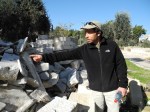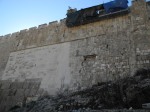Well – here it is, the post that explains why I’m quitting the Post. “Quitting the Post!” you say, with a shocked expression. “But ever since you were 12 years old, all you wanted to be was a reporter in Jerusalem! You have all that, a crazy flexible schedule, the ability to work in pajamas all day, sneaking a beer whenever you feel like it, complete freedom in everything you do, on a first-name basis with the mayor, and have the city’s major movers and shakers on speed dial – how could you walk away from THAT?”
And when you put it that way, well, you’re right. How could I walk away from what is in many ways my perfect job?
While casting about on the world wide web for the next direction my life will take, I came across an application for a journalism fellowship that resonated deep in my soul.
“Cynicism and world-weariness—that sense of having seen everything before—are toxic in journalism. You need an ongoing sense of wonder at the world: an unrelenting curiosity, and more… You need to take joy in finding the counter-intuitive ways in which your stories play- out, internationally.”
Put simply, I have lost my sense of wonder. When my police beeper beeps, I’m no longer curious to see what has happened, I just pray that I can write it up in a few sentences and be done. After meeting with an older journalist I very much admire, she cautioned me that burnout was part of the package of being a daily reporter. To combat burnout, she suggested, have one story per week that brings back that spark, that love of reporting, that got you into the field in the first place. “Call it in” – do the minimum if you have to, something I hate deep within my bones, in order to meet the daily requirements of your job. But make sure once a week that you find that one story you so excited to interview people about are so excited to turn in to your editor.
So that worked – for about four months. I wrote a number of stories I was very proud of, even in the midst of a major burnout. Now I have hit the point where the burnout is all-encompassing. I’m done, finished, finito. I can’t work up the enthusiasm I once had for being a Jerusalem reporter. I struggle every single day when I sit down to write my stories. I waste hours procrastinating, I check Facebook obsessively, something I rarely do when I’m excited about writing. When I find myself scanning the BuzzFeed pets section for the 50 cutest dog faces, I know I’m in trouble.
That cynicism and world weariness has become overwhelming, and I do feel like many of the stories I’m writing I’ve written in some other form before.
Originally I planned to only stay at this job for a year, in order to preserve my humanity and my sanity. I believe that I have been able to preserve my humanity – the sensitivity that sets me apart from many of the ruthless Israeli journalists, like the one who recorded a grieving mother screaming at him and then cynically sent it to the rest of the Jerusalem reporters to laugh at her (true story). But now I have to worry about my sanity.
Part of the reason that I have blogged less and less as time goes on is that the wonder has disappeared. I feel less of a need to work through my emotions through this informal blog because, frankly, I care less and less. Also, the stories are less surprising to me, less challenging.
I think what makes me a successful journalist is my ability to relate to a range of different people in different situations. Some of my crazy life experiences – Christian missionary in Peru, lonely and depressed in Spain, trip leader in Ecuador, bike tourer through the West Coast – open me up to the wide range of human emotion and experience. So now it’s time for some new experiences. To stretch myself beyond my comfort zone and remind myself that the world does not revolve around Jerusalem.
To reclaim my Spanish after years of neglect as I traded my rr’s for reshes. To live again on less than $10 per day as I travel through lands exotic and strange, to experience the joy of a surprise magic moment while traveling when everything just comes together even though I’m sure it’s about to fall apart. To take stock of my life and my career and to get a lot of physical distance from both in order to illuminate the next step for me.
In Israel, the concept of “tiyul hagadol” – the big trip after your army service – is a time-honored tradition. The idea that at age 27 I plan to be unemployed and homeless for a year is a bit harder to swallow for my American friends and family. But I know that this is the right move for me, to reignite that spark of curiosity that makes every day full of stories I can’t wait to share with the world.
Jerusalem is a Port City
By Yehuda Amichai
Jerusalem is a port city on the shore of the ages of ages.
The Temple Mount is a great ship, a pleasure yawl
In splendor. From the portholes of her Wailing Wall, jubilant saints
Peer like passengers. Hasidim on the pier wave
Goodbye, yelling hurrah, bon voyage. She
Is always docking, always embarking. And the fences and docks
And policemen and flags and churches’ high masts
And the mosques and the smokestacks of synagogues and the chanteys
Of praise and mountain-billows. The ram’s horn sounds out sunset: one more
Has set sail. Yom Kippur sailors in white uniforms
Ascend between the ropes and ladders of tried-and-true prayers.
And the profits of market and gates and goldencap domes:
Jerusalem is the Venice of God.
####
I haven’t given you fair warning
But our ship, she sails at dawn…
It’s true I must be going but I swear I won’t be long
There isn’t that much ocean between Boston and St John’s
I’m a rover and I’m bound to sail away
I’m a rover can you love me anyways?
–Great Big Sea












